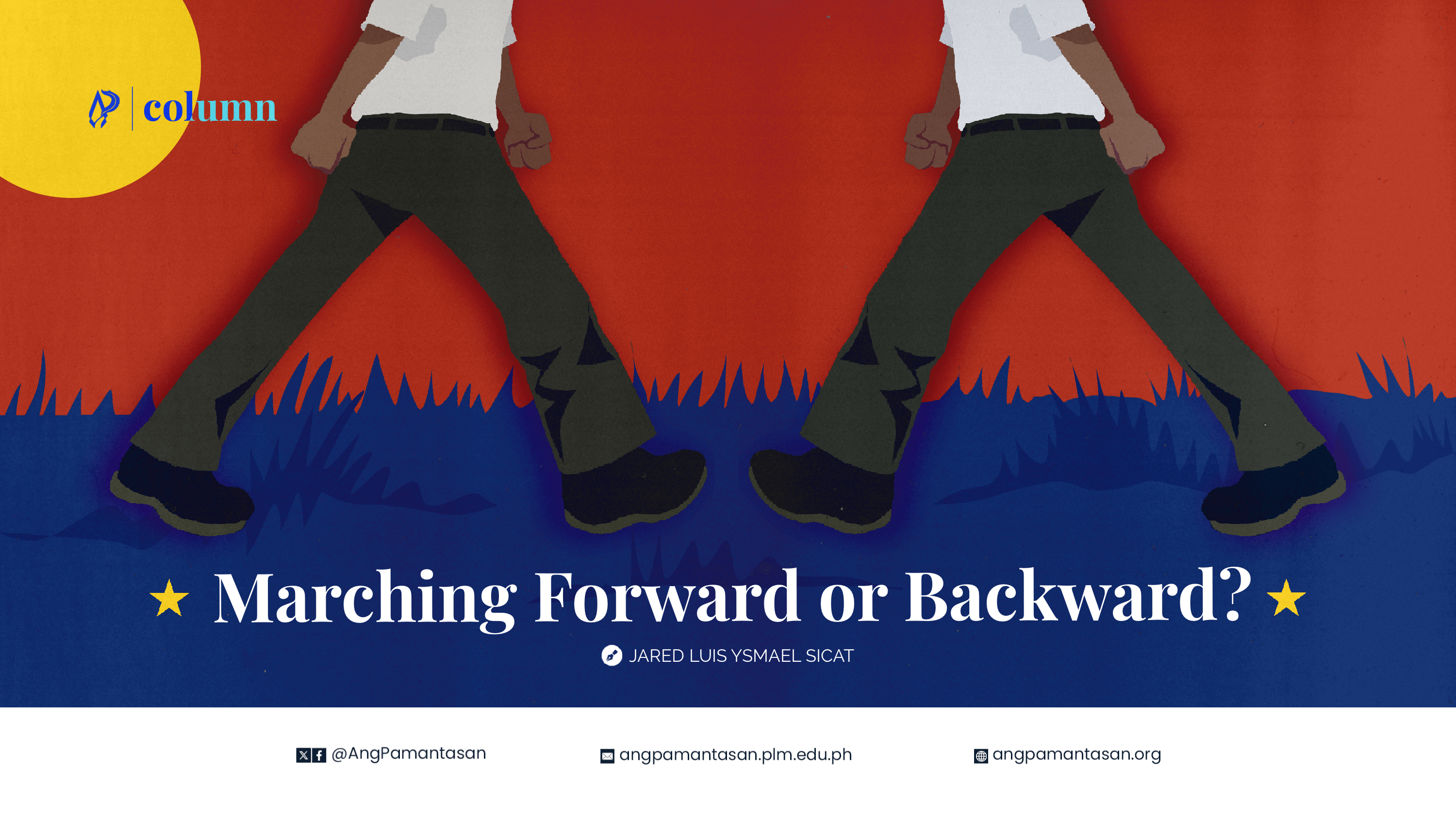Marching Forward or Backward?
Written by Jared Luis Ysmael Sicat • Board by John Ivan Pasion | 7 October 24
President Ferdinand "Bongbong" Marcos Jr. has endorsed Senate Bill No. 2034, which reinstates the mandatory Reserve Officers' Training Corps (ROTC), moving the bill to Tier 1 legislative priority once sessions resume in November.
The program is framed as a patriotic duty meant to instill discipline, national pride, and defense, but given its history of brutality—would this be a march forward for patriotism, or will it be a march backward to a time marked by abuse and murder?
Senate Majority Leader Francis Tolentino highlighted how the curriculum could possibly include topics like climate change and disaster preparedness alongside their military training. However, it rather feels like an attempt to obscure the grim past connected to it.
The horrors of ROTC may be traced back to 2001, when University of Santo Tomas (UST) ROTC cadet Mark Welson Chua was murdered by four senior cadet officers after writing an article tackling the corruption within his platoon.
His murder sparked national outrage that eventually caused the abolition of mandatory ROTC with the implementation of the National Service Training Program (NSTP) Act of 2001. The law introduced the Civil Welfare Training Service (CWTS) and Literacy Training Service (LTS) alongside ROTC.
While the law originally aimed to provide alternatives to ROTC, this intent seems to have been disregarded with this year’s enrollment, with most freshmen students observing that CWTS and LTS were only available on a slot-based system, and late enrollees were involuntarily placed in ROTC.
Limited slots leave no real choice.
Previously, PLM students would automatically be set to CWTS, with the ability to opt into ROTC or LTS. In contrast to this year’s enrollment process, where both CWTS and LTS were not allotted enough slots to accommodate the students.
What is notable here is that this year only the ROTC had enough available slots to accommodate the NSTP. You can notice the impact with the ROTC student population last year only having less than 300 cadets, while this year has more than 550 cadets.
This enrollment process is, in itself, a loss of academic freedom.
What initially was presented to be a choice between different service programs suddenly turned into a measure where ROTC became the default for students who missed out on the limited slots.
The idea that students must be conscripted into the military program without an option already contradicts the very values of autonomy and freedom that the university upholds.
PLM has consistently maintained their stance against hazing, priding itself on being a safe environment for students. Yet, despite the ROTC program not involving hazing in a traditional sense, concerns remain that the very structure of the program permits ways of mistreatment, which echo the same dynamics the anti-hazing policies seek to eliminate.
In the preceding year, there have also been issues with the military police (MP) platoon’s ‘power-tripping’ and ‘favoritism.’ The MP would use its authority against the cadets while turning a blind eye to the misconduct of cadets they’re affiliated with.
Some MPs would have a tendency to boast about their power to give demerits to their fellow cadets, constantly bragging about their power to give demerits to them. These attitudes not only fuel resentment for the cadets but also undermine the credibility of the program itself.
The war over equality in identity.
There were also members of the LGBTQIA+ community who voiced concerns over potential discrimination and harassment within the hyper-masculine and hierarchical structure of ROTC.
Sen. Ronaldo “Bato” Dela Rosa remarked that the members of the LGBTQIA+ should not be exempted from the mandatory military service as part of the pursuit of the “gender equality” that the community advocates for. Though it seems unreasonable to champion equality in the context of compulsive military training when the rights in protecting queer people are not equal in themselves.
These cadets have constantly been subjected to discrimination, humiliation, and harassment—truly highlighting the inhospitality of the program to those who do not conform to traditional gender norms.
Obligating students into a program with such a contentious background that exposes them to potential abuse, discrimination, and coercion is not the right way to foster national pride.
The time to discuss alternatives is now. Our students deserve choices, not mandates.
One alternative proposed by student advocates is to reinforce the general education subjects such as Filipino, Araling Panlipunan, and Social Sciences.
By teaching the students about the country’s rich history and the sociopolitical challenges that it faces, it can help students gain a deeper sense of nationalism without the physical and psychological toll coming from military service.
Civic engagement is not solely about defending their nation with arms but also understanding its struggles in the past.
Yet somehow, our military budget continues to increase for the following year when educational funding at state universities and colleges receives constant budget cuts.
And while national defense is undoubtedly important, should the responsibility of military training really fall on college students when we already have a highly budgeted military?
Overall, this poses a question: is it worthy enough to merely force students into a program that has historically failed to protect them?
